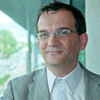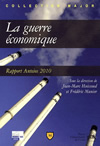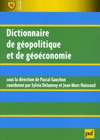Introducing Jean-Marc Huissoud
 Jean-Marc Huissoud is Professor of Geopolitics at Grenoble École de Management (France). Moreover, he is Director of the Center for Governance and Geopolitical Studies. Professor Huissoud is also Director of the Festival de Géopolitique that takes place annually in Grenoble.
Jean-Marc Huissoud is Professor of Geopolitics at Grenoble École de Management (France). Moreover, he is Director of the Center for Governance and Geopolitical Studies. Professor Huissoud is also Director of the Festival de Géopolitique that takes place annually in Grenoble.
The next edition will take place from 3-7 April 2013 and address the dark side of globalization. He is a graduate of the Institut d’Etudes Politiques (IEP) in Grenoble.
Geopolitical Passport
Your relationship with geopolitics
At what age did you discover geopolitics and what attracted you to it?
 As far as I remember I became interested in international affairs during my scholarship, trying to understand a world which, for my generation, was dominated by the Cold War and a more or less permanent feeling of danger.
As far as I remember I became interested in international affairs during my scholarship, trying to understand a world which, for my generation, was dominated by the Cold War and a more or less permanent feeling of danger.
I discovered geopolitics as an academic discipline thanks to my job with ESC (École Supérieure de Commerce) in Grenoble, launching a program for business students on this subject. I must admit that very soon I had some doubts about the limitations of the geopolitical approach, which in the French tradition refers to conflicts on or over particular territories.
However, I would say that not all relations between human societies are conflict-oriented, and not all conflicts are waged on or because of geographical territories. International Relations theory had in my view similar limitations, and the International Political Economics approach too.
So I soon focused my analysis on a wider approach, more based on Historical Sciences methodology than pure geopolitics which is often dominated by its geographical roots.
Which geopolitical topics have your focus and why did you choose especially these?
If we consider my geographical areas of preference, the Middle East and the USA are my favorites for several reasons.
First I have been in touch since my childhood with the Muslim world (many of my neighbours and school friends were Muslims) and the modern image of this part of the world does not fit with how I have experienced it in my childhood. Both Westerners and Muslims have contributed to profound changes in the definitions of the Muslim world and its perceived identity worldwide.
Another point about this world is that I was not satisfied with the basic analysis made of the Middle East dynamics: nor is it only about oil strategies or the Palestinian question, nor post-colonial domination, nor even outdated religious references and mysticism.
The first true keys were given to me by my teachers at the Institut d’Etudes Politiques (IEP) in Grenoble in my twenties. The USA are my second favourite, in part because of my first one. In Europe, the USA is both admired and hated. Some consider Americans as childish, egoistic and rather stupid, overseas Europeans.
Here also I find it very interesting and necessary to battle prejudice. One thing I often underline in my lessons is how similar the USA and the Middle East are from a spiritual point of view: both are home to a religious approach of the world and history.
In my view, it is no surprise that people there consider each other as enemies or competitors: both are defending an eschatological view of the world, just like the USA and the USSR did in the past, on a different level of course, and with different political structures.
However, my geopolitical areas of interest are in fact wider than these regions: my main interest is in the dynamics of the world, with a special scope on world governance and globalization, and their political, ideological, economical, technical and social aspects.
For I believe we are at a decisive moment in history where a certain balance of the world power is changing: not only a relative decline of the western world dominance, but a change of meaning of the very concepts of Power, politics, economics and societies. A huge subject as you can see, and I perfectly know the rest of my life will not be enough to cope with it.
What do you consider your most important contribution to geopolitics
 I am very proud of having co-directed, and heavily contributed to, the geopolitical and geoeconomic dictionary published in 2011 by Presses Universitaires de France, with my colleagues and friends Pascal Gauchon and Sylvia Delannoy.
I am very proud of having co-directed, and heavily contributed to, the geopolitical and geoeconomic dictionary published in 2011 by Presses Universitaires de France, with my colleagues and friends Pascal Gauchon and Sylvia Delannoy.
Though it can still be further improved I believe it is an important step to make people figure out how complex human societies in general, our world and international relations are, though understandable if we can get rid of prejudice and instead first look at and then accept analysis.
My best contribution however is certainly the Festival de Géopolitique (and Geoeconomics) that came into being four years ago and that has since been organised each Spring in Grenoble. As director of the event, I am proud of having assembled all academic disciplines, people with various professional backgrounds (managers, politicians, academics, civil servants, etc;) to share views on key subjects, in the presence of a varied audience. Since the start, the event has become more and more international and well known, and I believe it has succeeded in bringing fresh views on and deep insight into major geopolitical issues.
The 2013 edition will take place from 3-7 April, as always in Grenoble. It will address a very potent theme: the dark side of globalization. Most events during the Festival are in French, but some are now in English. All can be watched on the festival website, live or on demand.
Your geopolitical preferences
What is your favourite definition of geopolitics
My own definition would be “human political groups in relation to each other”, but in fact I gave a three hours lecture to begin to answer this question, because it is very complex.
The most existing definitions do not satisfy me, though they are all interesting and, within certain contexts, correct. I would like to stress that relations are not necessarily conflictual (why do certain apparently faulty political constructs not fail and lead to political or social violence? Because of cooperating and peacekeeping process) and that ‘political’ does not need to be necessarily linked with the ‘State’.
I am very careful with International Relations theory approach which considers the international scene as similar to interpersonal relations in an anarchic society made of nations-states. Some of the IR principles are nevertheless fruitful (Stanley Hoffmann’s ‘chessboards theory’ for instance).
I also like François Thual’s basic questions for geopolitics: who wants what, why, competing with whom, when, and how? In fact, every definition and theory has something useful. The very fact that it exists is itself informational about how people consider the world and act on it.
I think that geopolitics is a way of looking the world, an understanding of what has happened and could happen in the near future (by carefully analysing omens). In my view, it is important to distinguish between representations that are culturally and ideologically grounded, and ‘reality’. Managers (which my students are trained to become) need appropriate tools to effectively address new developments, without being limited by ideology.
Which geopolitical scientist do you admire the most
In France, Michel Foucher is one of the few, I believe, who have developed the geopolitical discipline by introducing new points of view.
There are nonetheless others, such as Aymeric Chauprade (though I do not always agree with his ideas) and Antoine Sfeir. While organizing the festival, I met some brilliant young guys that are worth to be followed in the future: Olivier Zajec, Frederic Munier and many others.
I do admire also some of the great scholars in International Relations theory: Alexander Wendt, Kenneth Waltz and Barry Buzan.
To be honest, I cannot mention here all those whom I am grateful to for their intelligence and ideas. Many of them actually work in disciplines outside geopolitics.
What is your favourite geopolitical book
This is a very hard question. I cannot answer it as I change my mind in this regard too often.
What is your favourite geopolitical website
I like many website. The CIA World Fact Book is one of my favourites because of its weakness: it is representing so clearly the American point of view!
Seriously, the Diploweb website is very good, the one of the International Crisis Group is worth having a look, together with the websites of Foreign Affairs and Le Monde Diplomatique. Jean-Sylvestre Mongrenier (L’Institut Thomas More) is very interesting too, as is Gateway House.
I take care not to take my informations from a narrow selection of sources, so it is hard to tell I have a favourite.
The geopolitical future
In what direction(s) will geopolitical science be heading the coming decades?
I think a very important work has to be done in two joined directions.
First, just as the Historical Sciences have started to do, we have to build a really multilateral approach of geopolitics, taking into account the way it is thought in emerging countries, for instance. It is not a matter of building a consensual universal academic science, but to give attention to every possible approach and point of view in teaching and other public discourses.
Together with that I think a very basic work has to be redone on principles and concepts, for two main reasons.
First, they are mostly Western made and culturally biased. Second, most of them are either outdated in front of technological and political changes, or ill-defined and used by many authors and academics. For example, most geopoliticians use concepts coming from International Relations theory without the slightest idea of their place in the intellectual and academic debate taking place in this field, leading to misinterpretations.
The responses to Fukuyama or Huntington would have been very different in their time if commentators of world competition had known how classical and rather old school these theories were. Instead, they took it as brand new views and approaches towards a brand new world that had come into existence after the end of the Cold War.
However, it was only a matter of recycling old ideas to try to make sense of a world everybody had failed to anticipate. The same could be said of the way some geopoliticians use ideas from economic disciplines. (I know I will not make friends with this statement).
Which geopolitical subject has been too little in the spotlight and needs further research?
Certainly technologies and their impact on both the meaning of Power and the change they brought to the whole balance of the world politics. Geopolitics doesn’t know how to cope in depth with technologies. And no scholar seems to have any idea of how technologies change the world of political interrelations.
What will be the largest geopolitical challenge for the world in the 21st century?
I would dare to say: getting rid of the utopia of world governance (but not necessarily worldwide cooperation and solidarity), and dealing with the struggles for identity, dignity and self-determination among both the developed and the underdeveloped populations.
I truly think it is a dead-end track to try to build one common future for humanity. We need to accept that we cannot rely on economic growth in a world that is already overproducing and quickly depleting its resources.
To put it clearly: we have to come up with a new paradigm, because the one that has originated in the Western civilization is void of any future at a global scale.
